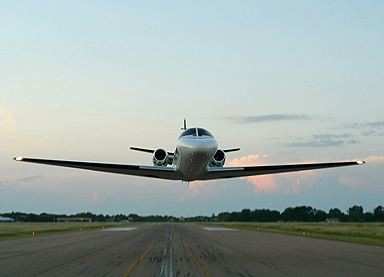Tue, Oct 16, 2007
Sierra Industries' tells ANN that their FJ44 Citation II
retrofit testing continues, nad boasts an accumulation of more
than 14 hours of flying time since their first flight on September
19, 2007.

More than 11 hours in the FJ44-3A powered aircraft, known as the
"Sierra Super II", have been conducted in Class A airspace above
25,000 feet and more than 5.5 hours have been in excess of 40,000
feet. Reaching a maximum speed of .705 Mach in straight and level
flight at FL430, the Sierra Super II successfully reached the
outside corner of the FAA-approved operating envelope.
Sierra test pilots reported several significant performance
improvements in the aircraft:
- Maximum Possible True Airspeed (TAS) in any jet aircraft occurs
where Vmo and Mmo cross which, in the Model 550, is at 30,500 feet.
This speed on an ISA Standard day is 412 knots and was validated in
flight test with the actual Sierra Super II aircraft.
- The Sierra Super II will exceed Vmo/Mmo in straight and level
flight at maximum weight and ISA at all altitudes up to FL390. It
will exceed Mmo at FL430 at weights below 12,000 lbs.
- The theoretical VFR range of the aircraft with reserves (700
lb.) is 2,064 NM. This figure is computed from flight data taken on
a cross country test flight October 9.
Details of the October 9 test flight include:
- The Sierra Super II took off with full fuel (5000 lb.), at a
takeoff weight of 13,650 lb., a temperature of +26°C (ISA
+13°) and climbed direct to FL430 in 24 minutes. The original
Pratt-powered aircraft requires 2 hours and 27 minutes to reach
this altitude under the same conditions*.
- The Sierra Super II flew 700 NM, landed, and departed again for
the 700 NM return flight. Total fuel consumption for the 1400 NM
round trip was 3,970 lbs, leaving a reserve of 1,030 lbs. - enough
to fly for another 90 minutes at 10,000 ft. and 180 KIAS.
- The Sierra Super II is more than 50 knots faster than the
original Citation II at roughly the same fuel flow (see table
below). Efficiency at FL430 is 16% better, resulting in a
significant increase in range at maximum high speed cruise.
- The Sierra Super II is even faster (3 to 7 kts) than the
Citation V at FL430 with the same fuel and payload weight. At the
same conditions, the Sierra Super II is 31% more fuel efficient
than the Citation V*.
* all Citation II and V performance with Pratt motors taken
from manufacturers Operating Manuals.
Sierra Super II Performance at FL430:

'Sierra Super II' FAA certification is expected by the end of
the year. The Sierra Super II modification provides significant
across-the-board performance enhancement to the Citation II -
boosting fuel efficiency as much as 25%, cutting time-to-climb to
under 25 minutes to FL430, extending range to 1775 NM, and more
than doubling maximum fuel payload. Dramatic reductions in takeoff
field length (more than 20% reduction at 5000 ft., ISA +20º),
coupled with increased climb rates 'make the Sierra Super II a
superb all-around performer for virtually any field conditions or
altitude.'
2007 pricing for the complete Sierra Super II modification
starts at $1.929 million (with trade-in credit for existing
engines) and includes Williams FJ44-3A engines and installation,
all associated structural changes to accommodate the increased
thrust, all necessary hydraulic, mechanical and electrical changes
and dual-channel FADEC for power management and full-time
synchronizing between engines.
More News
How To Get A Story On Aero-TV News/Feature Programming How do I submit a story idea or lead to Aero-TV? If you would like to submit a story idea or lead, please contact Jim Campbel>[...]
“As the excitement builds for the world of flight returning to Oshkosh in 2026, we wanted to ensure that advance tickets are available for those who enjoy giving AirVenture t>[...]
North Atlantic High Level Airspace (NAT HLA) That volume of airspace (as defined in ICAO Document 7030) between FL 285 and FL 420 within the Oceanic Control Areas of Bodo Oceanic, >[...]
Also: Cosmonaut Kicked Out, Airbus Scales Back, AF Silver Star, Russian A-60 Clobbered A Samaritan’s Purse humanitarian flight was hijacked on Tuesday, December 2, while atte>[...]
Also: IAE Acquires Diamond Trainers, Army Drones, FedEx Pilots Warning, DA62 MPP To Dresden Tech Uni The danger to the flight training industry and our future pilots is clear. Dona>[...]
 ANN FAQ: Contributing To Aero-TV
ANN FAQ: Contributing To Aero-TV Aero-News: Quote of the Day (12.10.25)
Aero-News: Quote of the Day (12.10.25) ANN's Daily Aero-Term (12.10.25): North Atlantic High Level Airspace (NAT HLA)
ANN's Daily Aero-Term (12.10.25): North Atlantic High Level Airspace (NAT HLA) Airborne 12.08.25: Samaritans Purse Hijack, FAA Med Relief, China Rocket Fail
Airborne 12.08.25: Samaritans Purse Hijack, FAA Med Relief, China Rocket Fail Airborne-Flight Training 12.04.25: Ldg Fee Danger, Av Mental Health, PC-7 MKX
Airborne-Flight Training 12.04.25: Ldg Fee Danger, Av Mental Health, PC-7 MKX




